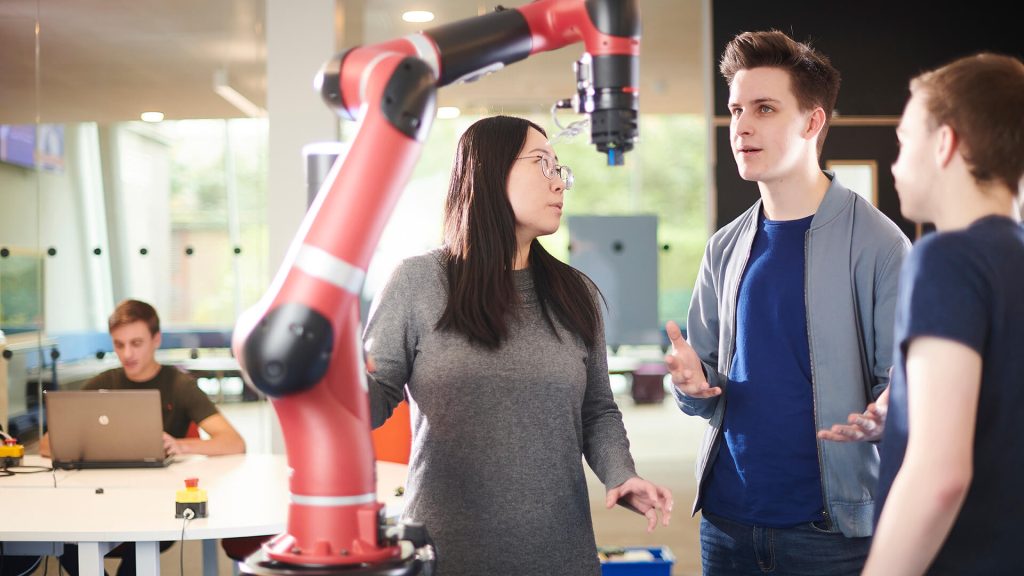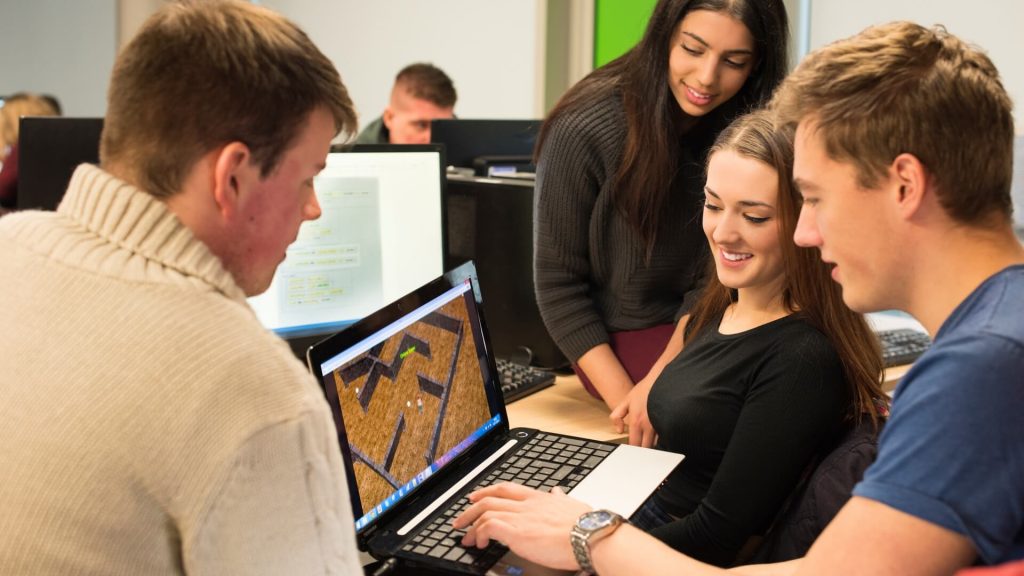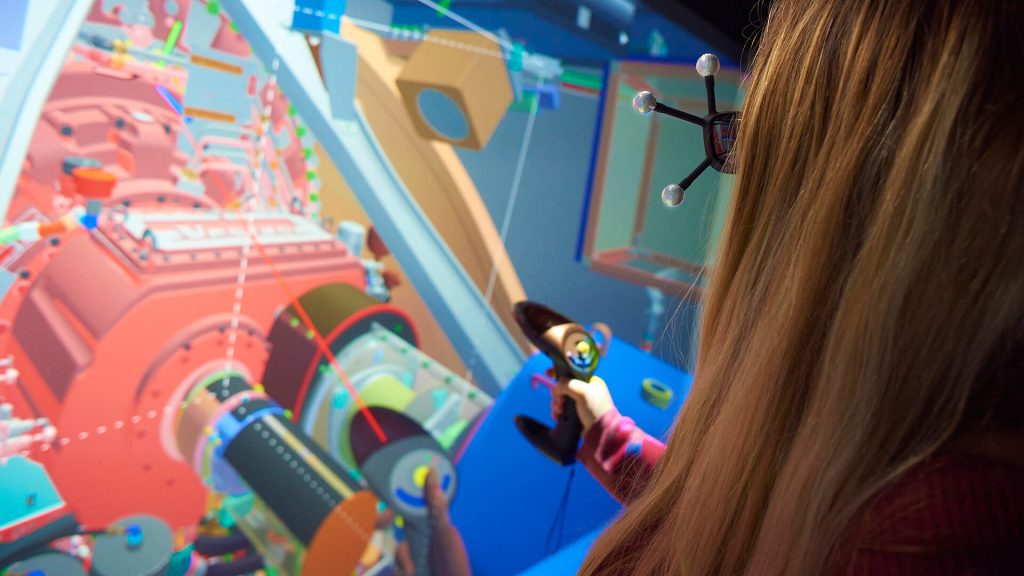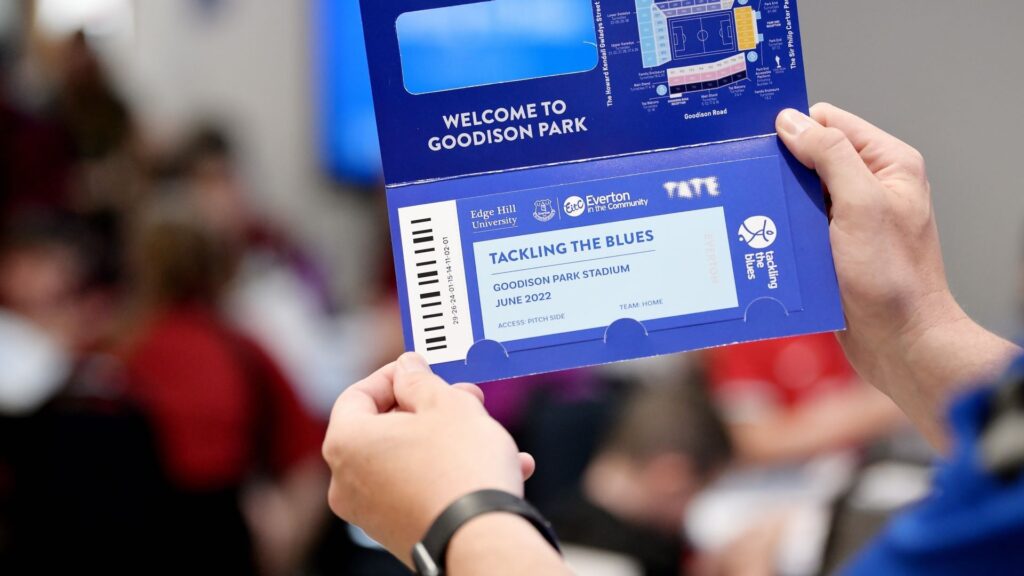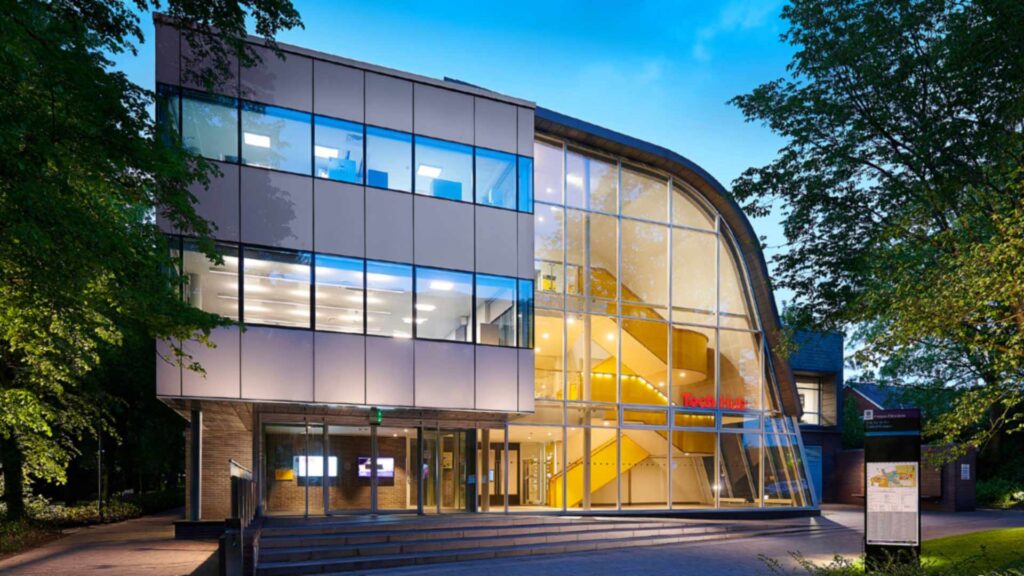Computer Science BSc (Hons)
UCAS code: CS12
Hardware. Software. Explore how it all works. Study new systems, new methodologies and new ways of thinking. Your creativity and originality could help drive technology forward on a degree awarded initial accreditation by BCS, The Chartered Institute for IT (subject to re-approval).
Overview
| Course length: | 3 years full-time Typically 4.5 years part-time |
|---|---|
| Start dates: | September 2024 September 2025 |
| Location: | Edge Hill University |
| Example offers: | BBC-BBB (A Level) or DMM (BTEC) View full entry criteria |
| Subject(s): | Computing, IT and Mathematics |
| Faculty: | Arts and Sciences |
| Department: | Computer Science |
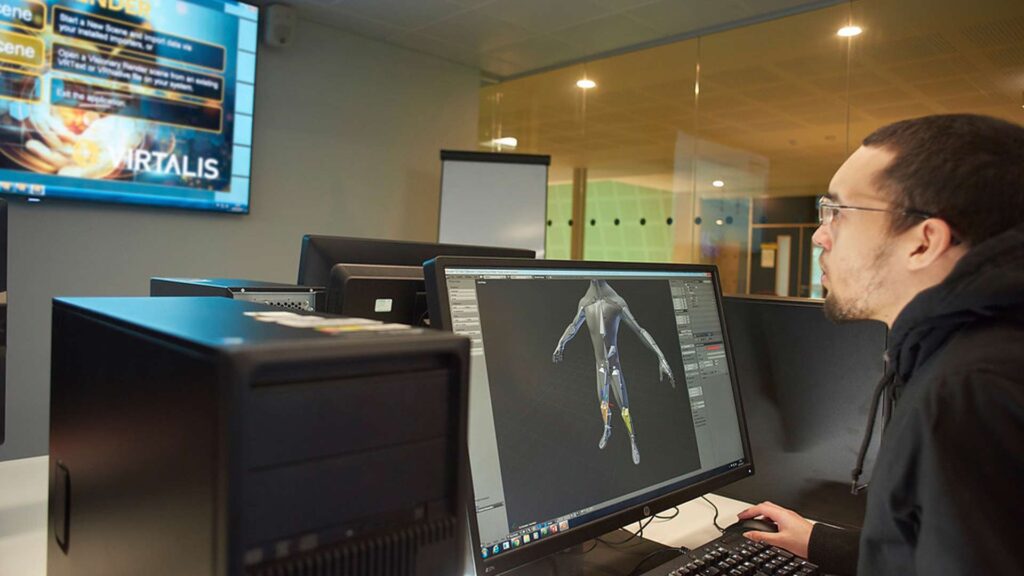
The computer chip in your phone has over 10,000 times the computational power of the one that took Neil Armstrong to the moon. With such advanced resources at our disposal, we have radically transformed our world for the better using a combination of software, innovative algorithms, and complex interconnected systems. You can be part of the next computing revolution with this computer science degree.
Develop essential skills for a career in computer science. Explore the bedrock of computation and mathematical theory and analysis. Discover which programming languages power global networks. Understand software development along with modern security issues and the importance of databases.
People are always looking for what’s next in computer science. Our £13m Tech Hub has the laboratories and workspaces to help you excel. You’ll apply computer science to intelligent systems, data science and complex systems, and get hands-on experience with industry-standard tools. Then take your skills and knowledge into a wide range of exciting industries and bring the future to life.
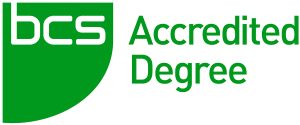 Subject to re-approval.
Subject to re-approval.
Course features
-
International students can apply
-
Professional accreditation
-
Sandwich year option available
-
Studying abroad option available
-
Work placement opportunity
What you'll study
Build the core foundations of your computer science knowledge in Year 1. Grasp the fundamentals of analysis. Learn what makes up the architecture of programming from systems to multimedia. Explore career possibilities helping you make the right choices for your modules in Year 2 and 3.
Develop specialist skills and make yourself more employable in Year 2. Discover databases, security and artificial intelligence. Use statistical techniques and test-structures. We’ll also test your progress and teamwork in a business environment solving real-world issues or making real products. At the end of Year 2, you can choose a 12-month industry placement or year abroad before starting your final year.
We’ll help you to become fully independent by the end of Year 3. You’ll show what you can do by creating a piece of software or hardware and explore the forefront of computer science. Develop confidence in your research and development abilities and statistical modelling. Then specialise in security, databases or intelligent systems.
Where your course includes optional modules, these are to provide an element of choice within the course curriculum. The availability of optional modules may vary from year to year and will be subject to minimum student numbers being achieved. This means that the availability of specific optional modules cannot be guaranteed. Optional module selection may also be affected by timetabling requirements. Some restrictions on optional module choice or combinations of optional modules may apply.
How you'll study
We will ensure you gain relevant experience and use industry standard equipment. Computing involves considerable practical activity and many classes are based in computer workshops, focusing on student activity as a means of learning. We introduce theoretical concepts by building on concrete practical activity.
To enhance your employability you will be given opportunities to work together and develop the essential people skills to complement your technical ability, as well undertake a work placement to enable you to relate theory to practice and build your transferable skills.
How you'll be assessed
You will be assessed through a combination of practical exercises, reports, essays and examinations. We want you to develop the ability to work effectively both independently and as part of a team, therefore assessment includes both of these forms, though the emphasis is strongly on individual work.
Who will be teaching you
You will be taught by staff who are passionate about student learning and development. The programme team includes specialists in computing and active researchers in areas including data science, web information architecture, visualisation and intelligent systems. Academic staff are regular contributors to academic conferences and journals.
Entry criteria
Entry requirements
Typical offer 112-120 UCAS Tariff points, for which no specific subjects are required, plus GCSE Mathematics at Grade C or Grade 4 or above (or equivalent).
Please note, for all programmes in the Department of Computer Science, a level 2 numeracy qualification is not considered as equivalent to GCSE Grade C or Grade 4 in Mathematics.
Example offers
| Qualification | Requirement |
|---|---|
| A Level | BBC-BBB. |
| BTEC Extended Diploma (or combination of BTEC QCF qualifications) | Distinction, Merit, Merit (DMM). |
| T Level | Overall grade of Merit. |
| International Baccalaureate (IB) | We are happy to accept IB qualifications which achieve the required number of UCAS Tariff points. |
| Access to Higher Education Diploma | 45 credits at Level 3, for example 15 credits at Distinction and 30 credits at Merit or 24 credits at Distinction and 21 credits at Merit. The required total can be attained from various credit combinations. |
Please note, the above examples may differ from actual offers made. A combination of A Level and BTEC awards may also be accepted.
If you have a minimum of two A Levels (or equivalent), there is no maximum number of qualifications that we will accept UCAS points from. This includes additional qualifications such as Extended Project Qualification (EPQ), AS Levels that haven't been continued to A Level, and General Studies AS or A Level awards.
English language requirements
International students require IELTS 6.0, with a score no lower than 5.5 in each individual component, or an equivalent English language qualification.
If your current level of English is half a band, one band, or one-and-a-half bands lower, either overall or in one or two elements, you may want to consider our Pre-Sessional English course.
How to apply
Apply full-time
Read our guide to applying through UCAS to find out more about the application process.
International
Please see our international student pages for further information about how to apply as a prospective international student.
Part-time applications require a direct application to Edge Hill. Please select the year of entry that you wish to apply for.
Should you accept an offer of a place to study with us and formally enrol as a student, you will be subject to the provisions of the regulations, rules, codes, conditions and policies which apply to our students. These are available at www.edgehill.ac.uk/studentterms.
If you join a full time undergraduate degree at Edge Hill University, we will guarantee you the offer of a room in our halls of residence for the first year of your course.
Discover our accommodation
Facilities
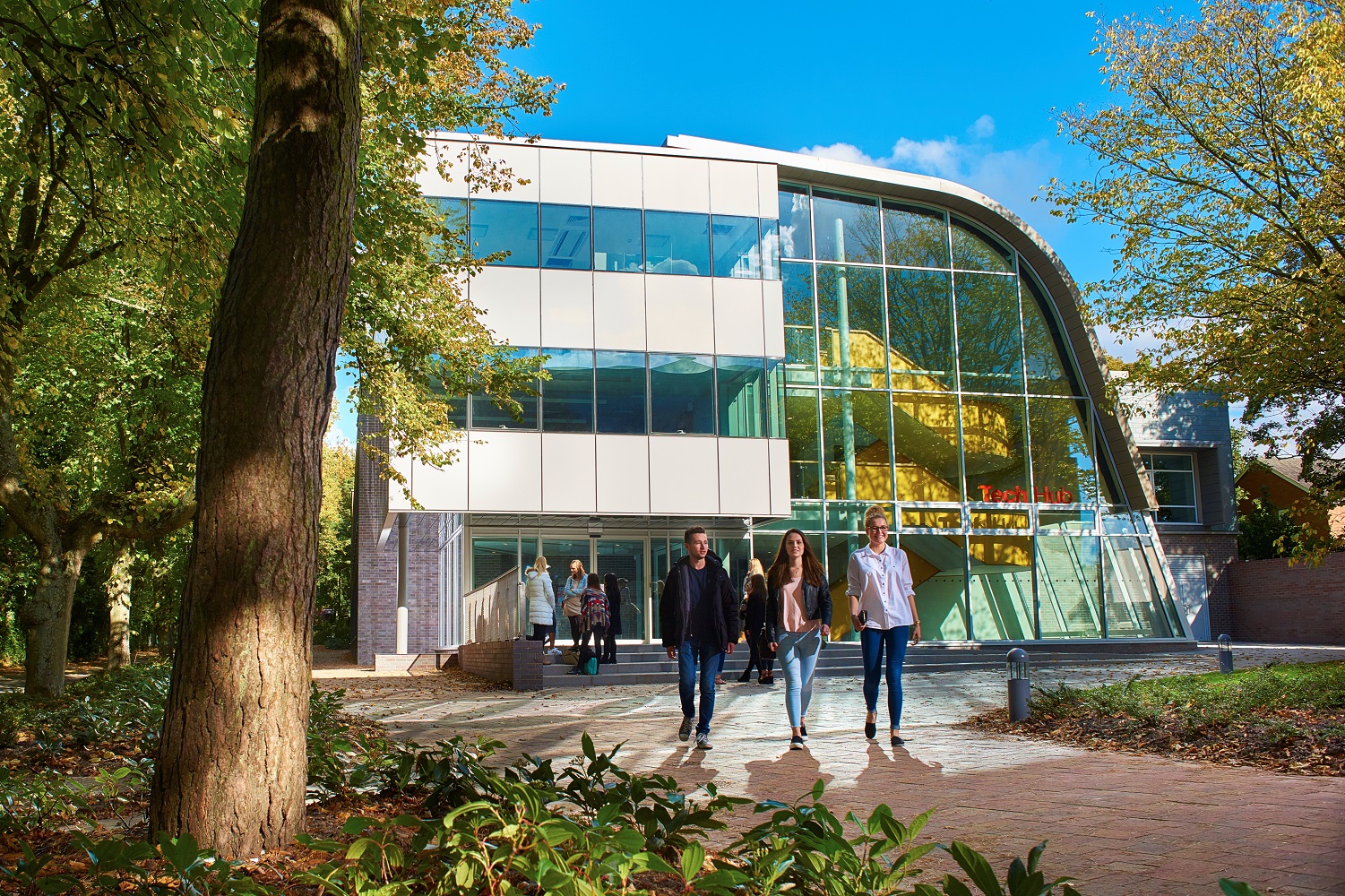 The Department of Computer Science is based in the state-of-the-art £13million Tech Hub. This purpose-built development offers highly contemporary suites of outstanding facilities for Computer Science and Engineering students. Our modern computing and engineering laboratories are equipped with comprehensive test and measurement equipment, high-specification computers, high-resolution screens and the latest hardware and software.
The Department of Computer Science is based in the state-of-the-art £13million Tech Hub. This purpose-built development offers highly contemporary suites of outstanding facilities for Computer Science and Engineering students. Our modern computing and engineering laboratories are equipped with comprehensive test and measurement equipment, high-specification computers, high-resolution screens and the latest hardware and software.
A four-screen CAVE (Computer Augmented Virtual Environment) provides a super immersive 3D virtual environment, enabling users to immerse themselves in a virtual room and experience real life scenarios in 4K resolution. There are also specialist laboratories for networking and games programming, in addition to a specialist research laboratory, open access laboratory and a Harvard style lecture theatre.
Where you'll study
Tech Hub
Learning resources
Learning resources include robots and a robotics simulator, wired and wireless networking hardware, graphics software, web development tools, software development environments, big data servers, eye trackers, giant 3D interactive teaching screens, and other specialist software required for studying forensics and internet security techniques.
Finance
Tuition fees
UK Full-Time
£9,250
a year
UK Part-Time
£77 per credit
for 360 credits
International
£16,500
a year
EU/EEA and Swiss students who have settled or pre-settled status under the EU Settlement Scheme, as well as Irish nationals, may be eligible for the UK tuition fee rate.
Financial support
Subject to eligibility, UK students joining this course can apply for a Tuition Fee Loan from the Government to cover the full cost of tuition fees. UK students enrolling on the course may also be eligible to apply for additional maintenance loan funding to help with living costs. Please view the relevant Money Matters guide for comprehensive information about the financial support available to eligible UK students, together with details of how to apply for potential funding.
EU/EEA and Swiss students who have settled or pre-settled status under the EU Settlement Scheme may be eligible to apply for financial support. Irish nationals can ordinarily apply to Student Universal Support Ireland (SUSI). If you are an EU student who does not have settled or pre-settled status, or are an international student from a non-EU country, please see our international student finance pages.
Your future career
A computer science degree opens the door to careers in a wide range of industries around the world. You could work in games development, health technology, banking, media, telecoms, and broadcasting. Almost every industry needs your skills in some way.
Computer science gives you the chance to work for exciting new start-ups or global big hitters. Our graduates have landed jobs with many prestigious companies around the world. We are proud to have alumni at Apple, Samsung, Jaguar Land Rover, Barclays, Very Group, and the NHS.
You could become an app developer or analyst, information or system analyst, or computer programmer. Job titles you could apply for include:
- Research Engineer
- Machine Learning Developer
- Software Developer
- Software Testing Engineer
- Java Developer
- Computer Science Teacher
- Test Analyst
Subject to reapproval, our BSc Computer Science has been awarded initial accreditation by BCS, The Chartered Institute for IT, for the purposes of fully meeting the academic requirement for registration as a Chartered IT Professional. Initial accreditation is granted to new programmes which are yet to have a graduating cohort. This is the first step to full membership and to receiving chartered status as an IT professional.
Course changes
Every effort has been made to ensure the accuracy of this information, however our courses are subject to ongoing review and development. Changing circumstances may necessitate alteration to, or the cancellation of, courses.
Changes may be necessary to comply with the requirements of professional bodies, revisions to subject benchmarks statements, to keep courses updated and contemporary, or as a result of student feedback. We reserve the right to make variations if we consider such action to be necessary or in the best interests of students.
